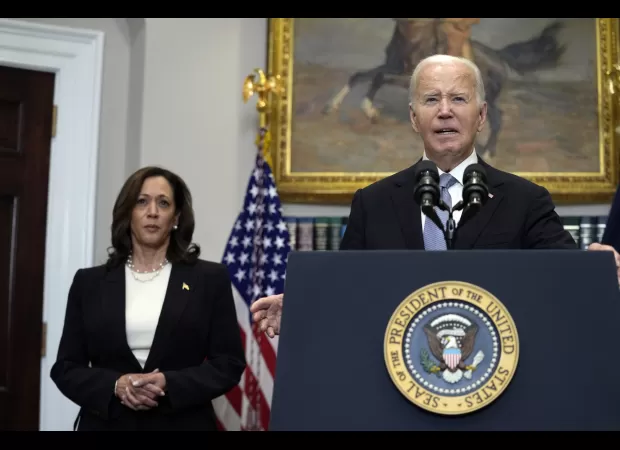Joe Biden plans to hand over the reins to Kamala Harris. Here's a potential scenario for how it could happen.
Biden drops reelection bid, backs Harris, creating unprecedented shift for Democrats. Convention in Chicago on Aug. 19-22 now uncertain.

By BILL BARROW
ATLANTA - The unexpected announcement from President Joe Biden that he will not be seeking reelection has sent shockwaves through the Democratic Party. In a historic move, Biden has also endorsed Vice President Kamala Harris as his successor, creating a shift in the political landscape this late in an election year.
With the Democratic convention just around the corner on Aug. 19-22 in Chicago, what was supposed to be a straightforward coronation for Biden has now turned into an open contest. Nearly 4,700 delegates will now be responsible for selecting a new candidate to challenge Republican Donald Trump in the upcoming fall election. The road ahead is uncertain, with many unanswered questions surrounding logistics, funding, and potential political fallout.
One of the most pressing questions is whether Biden can redirect his pledged delegates to support Harris instead. Despite winning every state primary and caucus earlier this year, current party rules do not allow for the transfer of delegates to another candidate. However, Biden's endorsement of Harris is expected to carry significant weight and could sway some delegates in her favor.
The convention itself is now in uncharted territory with Biden stepping aside and Harris as the frontrunner. While technically an open convention, with no clear nominee, the endorsement from Biden has given Harris a significant advantage. However, the pressure is now on Harris to secure the support of the nearly 4,000 delegates from the states, territories, and District of Columbia, as well as over 700 superdelegates including party leaders, elected officials, and former presidents and vice presidents.
There has been speculation about other potential contenders, such as California Governor Gavin Newsom and Michigan Governor Gretchen Whitmer, in addition to Harris. However, with Harris being the first woman, first Black woman, and first person of South Asian descent to hold national office, it would be a risky move for Democrats to overlook her in favor of a white nominee. This decision would also go against the significant support from Black voters, particularly Black women, that helped secure Biden's nomination. Any challenger would also have to consider the long-term implications of challenging Harris now versus preserving party unity for future presidential primaries.
At the same time, Harris has not been viewed as a particularly beloved or empowered vice president. The best-case scenario for her and the Democrats would be to quickly unite behind her and project a united front. The party may even proceed with their plans for an early virtual vote, a decision that was initially made to ensure Biden's nomination in time for Ohio's general election ballot deadline.
Another important aspect to consider is the fate of Biden's campaign funds. With a reported $91 million cash on hand and over $240 million at his disposal from allied Democratic campaign committees, Harris could potentially control these funds since the campaign was set up in her name as well as Biden's. However, if the party were to nominate someone other than Harris, the Biden-Harris account would face more restrictions. Legal experts suggest that it could become an independent expenditure political action committee, but would not be able to simply transfer its balance to another nominee.
The vice presidential nomination is always a separate vote at the convention. In most cases, the convention simply ratifies the nominee's choice. In this scenario, if Harris can secure the support of the delegates quickly, she could announce her choice for vice president, and it would be ratified by the convention. However, in a more extended battle, the vice presidency could become a bargaining chip, harkening back to the conventions of the past.
With any sudden change in a presidential campaign, there is bound to be a flurry of lawsuits at both the state and federal level. Some conservatives have threatened to challenge Harris' place on state ballots, but state laws typically do not dictate how parties select their nominees for president. In fact, some Republican figures, such as Ohio Governor Mike DeWine and Alabama Governor Kay Ivey, have already taken steps to ensure that Democrats have routine ballot access.
As the Democratic Party navigates this unexpected shift in their campaign, many uncertainties remain. But one thing is for sure, this election year is shaping up to be one for the history books. Stay up-to-date with the latest developments in Colorado politics by signing up for our weekly newsletter, The Spot.
2 Views


